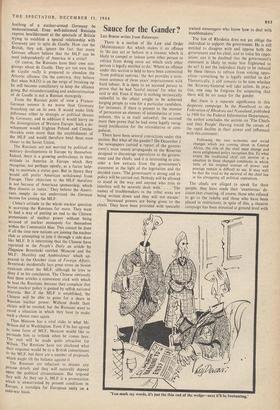Sauce for the Gander.?
LEO BARON writes from Bulawayo: There is a section of the Law and Order (Maintenance) Act which makes it an offence to 'do any act or behave in a manner which is likely to compel or induce some other person to refrain from doing some act which such other person is legally entitled to do.' Where an offence under this section is held to have been committed 'from political motives,' the Act provides a mini- mum sentence of three years' imprisonment with hard labour. It is Open to an accused person to prove that he had 'lawful excuse' for what he said or did. Even if there is nothing intrinsically unlawful in the object sought to be achieved (urging people to vote for a particular candidate, for instance), if there is present in the manner of persuasion an element of intimidation or com- pulsion, this is in itself unlawful; the accused must then prove that he had some legally recog- nised justification for the intimidation or com- pulsion.
There have been several convictions under this section. But what of the gander? On December 1 the newspapers carried a report of the govern- ment's most recent propaganda in the Reserves designed to discciurage opposition to the govern- ment and the chiefs, and it is interesting to con- sider a few extracts from the government's statement in the light of the legislation and the decided cases. 'The government is strong and its policy will be carried out. Nobody will be allowed to stand in the way and anyone who tries to interfere will be severely dealt with.' . . . The names of troublemakers in the tribal areas are being written down and they will not escape.' . . . 'Increased powers are being given to the chiefs. They have been provided with specially trained messengers who know how to deal with troublemakers.'
The law of Rhodesia does not yet oblige the individual to support the government. He is still entitled to disagree with and oppose both the government and his chief, and to voice his oppo- sition; can it be doubted that the government's statement is likely to. make him frightened to do so? Is not the individual likely to be induced by these threats to refrain from voicing oppo- sition—something he is legally entitled to do? Theoretically, it still remains to be seen whether the ,Attorney-General will take action. In prac- tice, one may be forgiven for suspecting that there will be no sauce for the gander.
But there is a separate significance in this desperate campaign. In the , Handbook to the Federation of Rhodesia and Nyasaland, published in 1960 for the Federal Information Department, the author concludes the section on 'The Chiefs and their People' (having traced the causes of the rapid decline in their power and influence) with this comment : Following the vast economic and social changes which are coming about in Central Africa, the role of the chief must change and more enlightened policy recognises this. To what extent the traditional chief can survive in a situation in these changed conditions in which little of his original sources of power and prestige remain is difficult to see. It may well he that the road to the survival of the chief lies in his abrogating all political aspirations.
The chiefs are alleged to speak for their people; they have made their 'unanimous' de- cision (not counting, of course, those who refused to go to the indaba and those who have .been placed in restriction); in spite of this, a massive campaign has been mounted at ground level with
'You mark my words, it's just the thin end of the wedge—next it'll be foxliunting.'
loudspeaker vans and film shows of the chiefs' overseas tour. This suggests that the government is preparing to embark on another opinion-testing exercise—perhaps this time including some form of vote.
On his return from London in September, Mr. Smith told the House that the method of testing African opinion must be fair, honest and above- board. Ignoring for this purpose other considera- tions, is it fair to confine the exercise to the Trust Lands, whose population is fewer than two million? Is it fair to exclude the urban dwellers (about half a million) and the farmers in the Native Purchase Areas (about a quarter of a million)? And to cap it all, the rolls for the referendum were closed as at August 31.
The rolls had been boycotted by Africans in 1961 when the issue was a general election under a constitution which had been rejected by the nationalist leaders. The issue at the referendum was independence under the present constitution —a completely different issue and one which could logically have been actively opposed with- out resiling from the 'non-participation' line. The government could not have known in ad- vance that this issue also would be boycotted; it is hardly fair to close the rolls at a date before the announcement that a referendum was to be held had even been made.





























 Previous page
Previous page